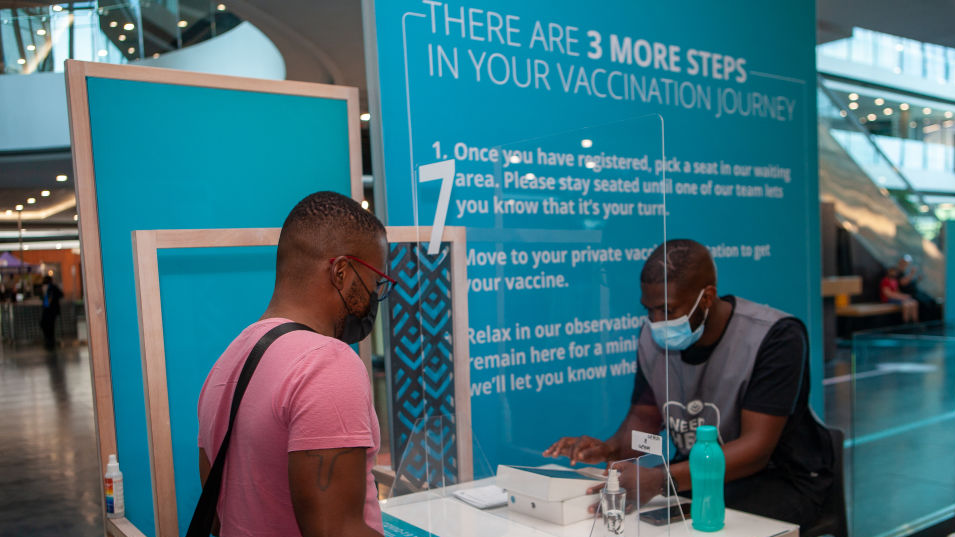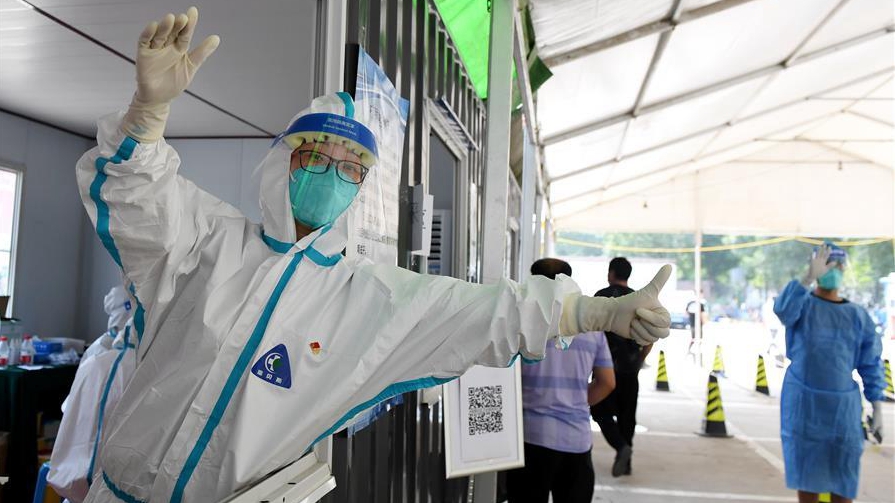
An overview of Discovery Health COVID-19 vaccination site in Sandton, South Africa, October 21, 2021. /Getty
An overview of Discovery Health COVID-19 vaccination site in Sandton, South Africa, October 21, 2021. /Getty
Editor's note: Stephen Ndegwa is a Nairobi-based communication expert, lecturer-scholar at the United States International University-Africa, author and international affairs columnist. The article reflects the author's opinions and not necessarily the views of CGTN.
"Houston, (read planet earth) we have a problem." Well, not exactly as the erroneous quote from the actual one recorded on April 13, 1970 when the Apollo 13 mission to the moon was rocked by an onboard explosion. But still, we've a problem!
Just after we thought it was getting to a modicum of peace and quiet in the fight against the coronavirus, the emergence of what the World Health Organization (WHO) has called a "new variant of concern" – Omicron, otherwise known as B.1.1.529 – has sent the whole world scampering for safety.
Sadly, the self-righteous Western world has already slapped travel advisories on the countries, located mainly in Southern Africa. But that is not really the problem. Travel advisories come with a lot of social, cultural and political baggage. Akin to China's angst during the initial branding of the corronavirus as the "Wuhan virus" by former U.S. President Donald Trump, Africa feels that the narrative reflects the same old Western prejudice against the continent as a harbor of disease and misery. India was spared this ignominy by renaming of the "India virus" to "Delta virus."
It is akin to blaming the victim, which is a testament of vaccine colonialism perpetuated against Africa. Either by coincidence or by design, the continent is the least vaccinated continent in the world, while the developed world wallows in vaccine excess due to the skepticism of its nationalities.
This variant has emerged on the eve of one of Africa's biggest dates on its calendar, the triennial Forum on China-Africa Cooperation presently underway in Dakar, Senegal. This perfect timing might be a damper on the event if some of the participants and guests are preoccupied with the fear of picking up Omicron along the way.
On the flip side, it is an opportunity for the conference to re-evaluate where Africa stands on the geopolitical scheme of things. Decisions must now be made to face up, once and for all, to the West's bullying by demanding empathy from the superpower. Most importantly, Africa must find ways of speeding up its vaccine cooperation with China, targeting the capacity for research, development and manufacturing of vaccines now and in the future.

A medical worker guides people at a nucleic acid testing site in the Tongzhou District of Beijing, capital of China, June 22, 2020. /Xinhua
A medical worker guides people at a nucleic acid testing site in the Tongzhou District of Beijing, capital of China, June 22, 2020. /Xinhua
In recent months, there has been a flurry of activities as countries have been working tirelessly to undo each other on who would be the first past the post in the race to a return to full opening up. But just like the variants before it, particularly Delta, Omicron has once again showed us that it is not over until it's over.
If the proof of the pudding is in the eating, China's effective strategies since the emergence of the coronavirus are a lighthouse that the world should use to get us all out of the throes of the pandemic. And, the country has laid it all down on the publication, "White Paper on Fighting COVID-19 China in Action," which was released on June 8, 2020.
Contrary to the impression given by some, the fight against COVID-19 will not be a walk in the park. China's white paper portrays the resolve of a government faced with an overwhelming once-in-a-century challenge and diligently rises up to the occasion. It is this single-mindedness in the fight against the virus that has helped to keep the country with near zero COVID-19 numbers for months on end.
China has never given knee jerk COVID-19 travel advisories, even to its neighbor India when the Delta variant was discovered in the country. The former focused on securing the situation at home and ensuring that both citizens and foreigners adhered to the strict protocols as directed by the government. There has been no room for careless compromise.
According to data from the WHO, China recorded 127,631 confirmed cases of COVID-19 with 5,697 deaths between January 3, 2020 and November 26, 2021. As of November 19, over 2.4 billion vaccine doses have been administered in the country's population of 1.4 billion.
According to the latest statistics, the U.S. has 48.1 million cases and 777,000 deaths from the pandemic, in a population of about 330 million. According to the U.S. Centers for Disease Control and Prevention, 231.4 million Americans had received at least one dose of a COVID-19 vaccine, out of which 196.2 million have been fully vaccinated.
From the foregoing, it is fairly obvious who between the two major countries in the world can take the moral high ground in pulling the world out of the pandemic quagmire. Instructively, China was the only major country to record positive economic growth in 2020. Worldwide experience over the last two years and China's experience as documented in the white paper, have shown that we cannot have our cake and hope to eat it at the same time.
It will take hard work and leadership from top to bottom to contain the virus. Where personal freedoms and conveniences have to be curtailed for the greater good, it will be a small price to pay for progeny.
(If you want to contribute and have specific expertise, please contact us at opinions@cgtn.com.)

